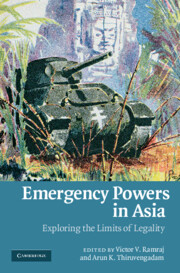Book contents
- Frontmatter
- Contents
- List of contributors
- Preface
- 1 Introduction: emergency powers and constitutionalism in Asia
- PART I Perspectives from legal and political theory
- PART II Postcolonial and post-conflict transitions
- PART III Emergencies, executive power and constitutional order
- 10 Emergency powers and the rule of law in Indonesia
- 11 Emergency powers with a moustache: special powers, military rule and evolving constitutionalism in Thailand
- 12 Emergency powers and the limits of constitutionalism in Japan
- 13 States of exception in an exceptional state: emergency powers law in China
- PART IV The role of the courts
- Index
- References
11 - Emergency powers with a moustache: special powers, military rule and evolving constitutionalism in Thailand
from PART III - Emergencies, executive power and constitutional order
Published online by Cambridge University Press: 04 August 2010
- Frontmatter
- Contents
- List of contributors
- Preface
- 1 Introduction: emergency powers and constitutionalism in Asia
- PART I Perspectives from legal and political theory
- PART II Postcolonial and post-conflict transitions
- PART III Emergencies, executive power and constitutional order
- 10 Emergency powers and the rule of law in Indonesia
- 11 Emergency powers with a moustache: special powers, military rule and evolving constitutionalism in Thailand
- 12 Emergency powers and the limits of constitutionalism in Japan
- 13 States of exception in an exceptional state: emergency powers law in China
- PART IV The role of the courts
- Index
- References
Summary
Introduction
On 16 July 2005 the Thai-language newspaper Thai Post in Bangkok published as its front-page article comment on the Decree on Public Administration in Emergency Situation 2005, which had been passed by the executive the day before, under the headline ‘Decree with a Moustache’. The article likened the powers assumed by the executive under the decree to those of the Nazi Gestapo in Hitler's Germany. The decree, a response to the continuing separatist insurgency in the Malay/Muslim southern provinces of Thailand, and ostensibly intended to consolidate several existing applicable laws, empowered the Prime Minister to order wire taps, censor the press, restrict freedom of assembly and movement, confiscate and destroy property and preventively detain suspects in undesignated places without criminal charge; it also transferred all governmental authority in an area subject to an emergency declaration into the Prime Minister's own hands. These powers were expressed to be exercisable with no, or minimal, judicial oversight or access to justice and with immunity from legal consequences. The decree sparked extensive public debate about the role of emergency powers and the legitimate powers of the executive and the military. This debate continued in 2006–7 during which period a military coup (19 September 2006) overthrew the Constitution and the government and the interim legislature passed the Internal Security Act 2007. The debate revealed great concern, both in Thailand and internationally, over numerous aspects of these exceptional laws and military actions.
- Type
- Chapter
- Information
- Emergency Powers in AsiaExploring the Limits of Legality, pp. 294 - 313Publisher: Cambridge University PressPrint publication year: 2009
References
- 2
- Cited by



